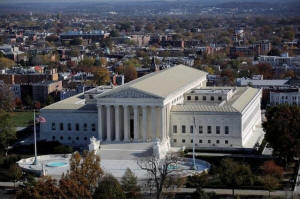|
Potentially nasty fight looms over Trump
U.S. Supreme Court pick
 Send a link to a friend
Send a link to a friend
 [January 18, 2017]
By Andrew Chung [January 18, 2017]
By Andrew Chung
WASHINGTON (Reuters) - Senate Democrats are
gearing up for a potentially ugly fight over Donald Trump's U.S. Supreme
Court pick, with some liberal activists urging them to do everything
possible to block any nominee from the Republican president-elect.
Democrats are still seething over the Republican-led Senate's decision
last year to refuse to consider outgoing President Barack Obama's
nomination of appeals court judge Merrick Garland for a lifetime post on
the court. The action had little precedent in U.S. history and prompted
some Democrats to accuse Republicans of stealing a Supreme Court seat.
Trump last week vowed to announce his appointment within about two weeks
of taking office on Friday. He said he would pick from among 20
candidates suggested by conservative legal groups to fill the lingering
vacancy caused by the death of conservative Justice Antonin Scalia last
Feb. 13.
Scalia's replacement could tilt the ideological leaning of the court for
years to come, restoring the long-standing conservative majority that
disappeared with Scalia's death just at a time when it appeared liberals
would get an upper hand on the bench.
Liberal groups are gearing up for a battle, with the People For the
American Way calling the judges on Trump's list of candidates "very
extreme."

"We're hearing from Senate Democrats and parallel concern among outside
groups that this is going to be a major fight," said Marge Baker, the
group's executive vice president. "We'll be arguing that Democrats use
every means at their disposal to defeat the nominee. This is going to be
'all hands on deck,' using all means at our disposal."
Senate Democratic leader Chuck Schumer has said it is hard for him to
imagine Trump picking a nominee who Democrats could support, and said he
would "absolutely" fight to keep the seat vacant rather than let the
Senate confirm a Trump nominee deemed to be outside the mainstream.
"We are not going to make it easy for them to pick a Supreme Court
justice," Schumer told MSNBC on Jan. 3, adding that if the Republicans
"don't appoint someone who's really good, we're going to oppose them
tooth and nail."
Senate Democrats may be in a position to hold up Trump's selection
indefinitely. Senate rules require 60 votes in the 100-seat chamber to
overcome a procedural hurdle called a filibuster on Supreme Court
nominees. There are 52 Republican senators.
Assuming all 52 back Trump's nominee, Senate Majority Leader Mitch
McConnell either would need to lure eight Democrats to his side or
change the rules and ban the filibuster for Supreme Court nominations.
Republicans, then in the minority, complained that their rights had been
trampled when Senate Democrats in 2013 voted to eliminate the filibuster
for executive branch and judicial nominees beyond the Supreme Court.
'THIS IS A FIGHT'
Baker said liberals cannot hold their fire for fear that Republicans
will use this so-called nuclear option, adding, "At some point you don't
game this out. You say, 'This is a fight.'"
Other liberal groups urged a more conciliatory approach.
"We're not predisposed to opposition here," said Kristen Clarke,
president of the Lawyers' Committee for Civil Rights Under Law.
[to top of second column] |

A general view of the U.S. Supreme Court building in Washington,
U.S., November 15, 2016. REUTERS/Carlos Barria

Any nominee will be evaluated, Clarke said, adding that the group is
girding for a nominee who is hostile to civil rights.
Trump's nominee could influence the court on a wide range of issues
including abortion, the death penalty, religious rights,
presidential powers, gay and transgender rights, federal regulations
and others.
Political considerations also hang over the confirmation fight.
Democrats and the two independents aligned with them in the Senate
will be defending 25 seats in the 2018 elections, while Republicans
defend only eight.
Many of those Democratic seats are in Republican-leaning states
Trump won in the Nov. 8 election, including West Virginia, Missouri,
North Dakota, Indiana, Montana, Michigan and Ohio.
Republicans likely will target these and other Democrats in hopes of
coaxing them into backing Trump's nominee. That means Democratic
senators such as West Virginia's Joe Manchin, Indiana's Joe Donnelly
and Missouri's Claire McCaskill could face extra pressure not to
block Trump's Supreme Court nominee.
The liberal groups are facing off with well-funded conservative
adversaries. The Judicial Crisis Network, for instance, has said it
will spend at least $10 million on advertising and grassroots
efforts to pressure Senate Democrats to back Trump's nominee.
Carrie Severino, the group's chief counsel, said it would be
hypocritical for Democrats to block a vote after arguing the
Constitution required the Senate to act on Garland.

"A lot of them (Democrats) spent the last nine months saying there
is a constitutional duty to have a vote. I'd find it shocking if
they would not carry out what they think their duty is," Severino
said.
Nan Aron, president of the liberal Alliance for Justice, said the
high level of interest the vacancy has generated among activists,
lawyers, students and others makes up for the deep pockets of the
other side. "I don't think we'll need $10 million given the outcry
expressed already," Aron said.
(Additional reporting by Richard Cowan and Lawrence Hurley; Editing
by Will Dunham)
[© 2017 Thomson Reuters. All rights
reserved.]
Copyright 2017 Reuters. All rights reserved. This material may not be published,
broadcast, rewritten or redistributed. |